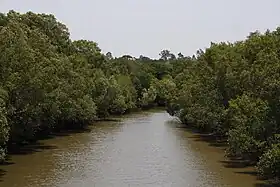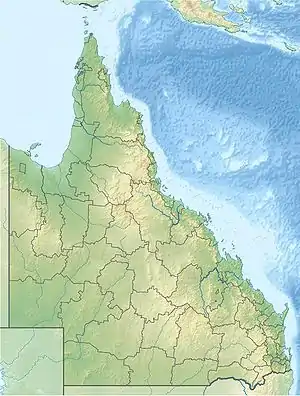Oxley Creek
The Oxley Creek (Yagara: Benarrawa[2]) is a creek that is a tributary of the Brisbane River, located in suburban Brisbane in the South East region of Queensland, Australia.
| Oxley | |
|---|---|
 Oxley Creek seen from Sherwood Road | |
 Location of the Oxley Creek mouth in Queensland | |
| Etymology | John Oxley |
| Native name | Benarrawa (Yagara) |
| Location | |
| Country | Australia |
| State | Queensland |
| Region | South East Queensland |
| Physical characteristics | |
| Source | Mount Perry near Flinders Peak |
| • location | Mount Perry, Scenic Rim |
| • elevation | 190 m (620 ft) |
| Mouth | confluence with the Brisbane River |
• location | Tennyson |
• coordinates | 27°31′26″S 152°59′41″E |
• elevation | 1 m (3 ft 3 in) |
| Length | 70 km (43 mi) |
| Basin size | 260 km2 (100 sq mi) |
| Basin features | |
| River system | Brisbane River |
| [1][2] | |
Rising in the low hills in Scenic Rim Region, water from the 260-square-kilometre (100 sq mi) large catchment area[3] flows into Oxley Creek as it flows through the western parts of Logan City and into Brisbane. At 70 kilometres (43 mi), the Oxley Creek is Brisbane's longest creek and the only sand-based one in the city.[4]
Course and features
.jpg.webp)
The headwaters of Oxley Creek begin on the northern slopes of Mount Perry, south of Ipswich, in the Scenic Rim Region. From here, the creek flows northwards about 70 kilometres (43 mi), eventually discharging into the Brisbane River at Tennyson.[1] Tributaries of Oxley Creek include Crewes Creek, Blunder Creek, Sheep Station Gully, Stable Swamp Creek, Rocky Water Holes Creek, Little Doris Creek and Moolabin Creek.

Oxley Creek's upper catchment is sparsely populated and largely natural, with forested hills and grazing land. However, in other parts of the catchment, urban development has had great impact. In the middle and lower catchment, Oxley Creek and its tributaries flow through 28 Brisbane suburbs including Algester, Corinda, Darra, Durack, Forest Lake, Moorooka, Salisbury, Sunnybank Hills, Graceville and Sherwood. Major industrial areas of Acacia Ridge, Coopers Plains and Rocklea are located in the catchment, as well as waste water treatment plants at Oxley and Inala, and the vicinity of Archerfield Airport.[1]
Oxley Creek is crossed by the Ipswich Motorway and Logan Motorway. The creek is tidal upstream to the Ipswich Motorway crossing.[5] In the suburbs of Oxley, Corinda and Tennyson the lower reaches of the creek contain the Oxley Creek Canoe Trail and are bordered by houses, parks, a driving range and sports fields. In these areas it is heavily polluted. These winding areas for the creek's catchment are prone to flooding, especially if there is an overflow on the Rocklea flood plains from the tributary Stable Swamp Creek.[1]
History
The Yerongpan clan of the Turrbal people are thought to have once roamed throughout the catchment. Traditional owners in the catchment made use of the abundant natural resources, various plants and animals were used as staple foods and the roots of the bungwall fern a particular favourite. They called the creek Benarrawa in their traditional Turrbal language.[2]
The creek was named in honour of John Oxley who first surveyed it in December 1823. Initially Oxley had called the creek the Canoe Creek.[3] This was in recognition of the first Europeans to reach the creek, Thomas Pamphlett, John Finnegan, Richard Parsons who reached the area after being shipwrecked on Stradbroke Island. At Oxley Creek the three found two canoes, one of which was used to cross the river and travel downstream.[6] By 1825 it had become known as Oxley Creek.[2][3]
As early as 1828, hoop pine was being felled near the mouth of Oxley Creek for use in the Moreton Bay penal settlement and in the area that is now known as Chelmer and Graceville.[6] In 1852, the first public bridge over the creek was built for the dray road that led to Ipswich.[6] By the 1860s timber cutters from Brisbane were entering the Oxley Creek flood plain.[6] The creek and tributaries were described as being surrounded by dense scrubland with patches of sub-tropical rainforest.
In 2006, the Brisbane City Council established the Lord Mayor's Oxley Creek Catchment Taskforce in an effort to rehabilitate the creek and its catchment.[4] In 2012, the taskforce was awarded 1st place in its category at the Healthy Waterways Awards.[7]
In 2017, Oxley Creek Transformation was established as a wholly owned Brisbane City Council subsidiary with a funding commitment of $100 million over 20 years for seeking environmentally sensitive outcomes by transforming the Oxley Creek corridor into a vast multi-use parkland, reducing impacts of industry and development on the creek and surrounds, embedding flood resilience into the corridor and growing its rich network of green spaces. Priority projects include a 20-kilometre recreation trail from the river to a new nature-based adventure parkland in Larapinta, a world-renowned birdwatching destination at Oxley Creek Common, a regional parkland at Archerfield Wetlands with a visitor centre, and whole-of-corridor environmental and economic strategies.[8]
Environmental concerns
Residential and industry development, sewage, sediment, land clearing and sand mining in the catchment have greatly affected the water quality of Oxley Creek, particularly in its lower reaches. At Larapinta sand mining converted the anabranch into the main stream, leaving a series of lagoons.[9]
Key environmental issues that face the catchment include rapid population increase and development, altered flow patterns of the creek causing active erosion, deteriorating water quality, increased noise and vehicle movements, waste disposal, invasion of bushland by exotic plants and animals, management of the extractive industries and the day-to-day behaviour of residents and workers of the catchment.
Local councils and bushcare groups have worked to reduce sediment entering the creek by planting vegetation. By 2008 improvements had resulted in water quality tests on the creek system's rating lifting from a F to a D.[10] However the rating returned to F in the following three years.[11]
Effluent from the Oxley Waste Treatment Centre was released into Oxley Creek during the 2010–2011 Queensland floods. Levels of bacteria 250 times higher than normal were recorded in the waterway.[12] Due to safety concerns parts of Oxley Creek were not immediately cleared of debris. Brisbane's Recovery Task Group has identified Oxley Creek along with a number of other waterways that are to be targeted in the recovery process that may take a number of years to restore.[13] According to the Queensland Minister for the Environment, Vicky Darling by January 2012, $16 million had been spent to remove more than 2,000 containers of hazardous materials from the catchment.[14] 500 tonnes of debris had also been collected from the banks of Oxley Creek.
Some locals want a groyne to be built at the mouth of the creek to aid flows and reduce sediment, while others want a halt to sand mining because it produces silt.[15]
References
- "Oxley Creek Catchment" (WORD). Know your creek. Brisbane City Council. 2012. Archived from the original on 22 September 2015. Retrieved 24 September 2015.
- "Brisbane River Catchment: Fact Sheet" (PDF). Waterways and Wetlands. Logan City Council. 2015. Archived (PDF) from the original on 4 March 2016. Retrieved 25 September 2015.
- "Oxley Creek (entry 25701)". Queensland Place Names. Queensland Government. Retrieved 7 April 2012.
- "Lord Mayor's Oxley Creek Catchment Taskforce". Brisbane City Council. 10 September 2012. Archived from the original on 3 December 2012. Retrieved 19 November 2012.
- "Calls for more information on Oxley Creek contamination". ABC Brisbane. Australian Broadcasting Corporation. 13 February 2012. Archived from the original on 25 September 2015. Retrieved 7 April 2012.
- Fones, Ralph (2006). Oxley! A mind of its own:a history of a suburb with attitude. 1850 - 1950. Oxley-Chelmer History Group. pp. 4–10. ISBN 0-9751466-2-9.
- "Taskforce recognised for its efforts to preserve parts of Oxley Creek". Southern Star. Quest Community Newspapers. 5 July 2012. Retrieved 19 November 2012.
- "Oxley Creek Transformation". Brisbane City Council. Archived from the original on 1 April 2018. Retrieved 7 May 2018.
- Mynott, Vicki (2009). 150 years: Richlands, Inala & neighbouring suburbs in Brisbane's South West. Richlands, Inala & Suburbs History Group. p. 157.
- "Oxley Creek Bonus", South West News, p. 2, 28 October 2008
- "Oxley Creek". Healthy Waterways. The University of Queensland. Archived from the original on 4 March 2016. Retrieved 7 April 2012.
- Walker, Jamie (29 January 2011). "Health alert as sewage spill becomes next threat for riverside homes". The Australian. News Limited. Archived from the original on 10 April 2011. Retrieved 28 February 2011.
- "Creek debris will be cleared soon". The Satellite. APN News & Media. 28 February 2011. Archived from the original on 6 July 2011. Retrieved 28 February 2011.
- Darling, Vicky (19 January 2012). "Communities to share in river cleanup grants". Ministerial Media Statement (Press release). Department of the Premier and Cabinet, Queensland Government. Archived from the original on 3 April 2012. Retrieved 7 April 2012.
- Drew, James (28 March 2012). "Residents call for action on Oxley Creek in lead-up to council elections". South-West News. Quest Community Newspapers. Archived from the original on 6 April 2012. Retrieved 7 April 2012.